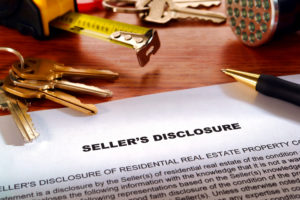
No matter how great a home looks at first glance, a host of problems could be hiding right under your very eyes, which is why any potential buyer will want to scrutinize the property disclosure statements.
According to legalmatch.com, “The Seller Property Disclosure Statement is a checklist designed to help sellers disclose to buyers any known property defects…the document is essentially designed to outline any flaw that the home sellers are aware of that could negatively affect the home’s value.”
What Types of Defects or Flaws Must Be Disclosed?
As a rule, it’s better to over-disclose defects rather than under-disclose them. The seller wouldn’t be doing themselves a favor by trying to protect themselves from liability.
Luckily, sellers are required to complete disclosure documents, which are often in the form of a government-issued checklist where they can notify the potential buyer if the home has or to their knowledge once had any of the following problems:
The federal government requires certain disclosures, however, some states and counties also have their own particular laws on which issues must be disclosed.
Disclosures can include anything from the knowing of nearby sexual offender, notification of a death on the property (especially if it was a murder.) Check with your individual state or county to find out what must be disclosed.
If buyers (and their real estate agent) read a disclosure document and don’t see anything to worry about they move on to the next step in the buying process, however, if there is a cause for worry at an item identified on the disclosure report you will have to move forward with caution and look further or choose to walk away.
What to do if a disclosure reveals something?
If you are made aware of something that causes concern, have your real estate agent bring it to the attention of the sellers. In some cases, they might have an explanation that puts you at ease.
At worst, you can always back out of the deal without penalty—meaning you won’t have to forfeit your earnest money deposit. And if you happen to find a problem that should have been disclosed but wasn’t, that’s all the more reason to consider carefully whether you want to move forward.
The caveat to the disclosures, are that the seller is only required to reveal any known problems. That’s key. It’s nearly impossible to hold a seller accountable for a problem they were not aware of.
Since there is no legal requirement for a seller to disclose any of the items other than those mentioned above, as a practical matter, buyers expect to get one.
There are exceptions for instance if the seller has limited knowledge of the property like an estate-owned property or a foreclosure. In those scenarios, the property is likely to be sold “as-is.” Even with these types of properties, however, the legal requirement to disclose known latent defects remain.
A thoughtfully completed, accurate and professionally presented Seller Disclosure gives prospective buyers confidence in the quality of the home and the care the owner has given it over the years.
The Certo Team
55 N. Arizona Place Suite #103
Chandler, AZ 85225
602-429-6789
https://www.downpaymentassistancearizona.com/
